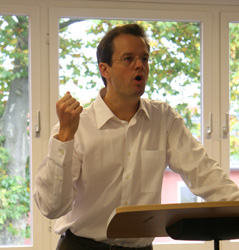
Having already adjusted to the academic environment of ECLA, the 2008-09 AY students had the opportunity to accompany their growing familiarity with Plato’s Republic with the lecture of Professor Devin Stauffer, a scholar of classical political philosophy. His impetus for reading and discussing Plato comes from his deeply ingrained belief that Platonic works contain “a richer and truer account of human life, of the soul and its deepest concerns, than one can find even in the greatest works of modern philosophy”.
The lecture started with a reference to the composition of The Republic, and the possibility of distinguishing “Book One” from the rest of the text, as two different dialogues. “Book One” is concerned with the various definitions of justice, while the rest of the work encompasses the conceptualization of the ideal city. Professor Stauffer quotes Friedrich Schleiermacher for this thesis; together with Friedrich Schlegel, Schleiermacher translated Plato into German at the beginning of the XIXth century. Unfolding upon his observations, Stauffer searches for the philosophical cement holding the two parts together, and finds it in the speeches of Glaucon and Adeimantos at the end of “Book Two”. What had happened in the first part was dissatisfying to the expectations of the two men, and culminated with the definition of justice given by Thrasymachus, namely, the advantage of the strong. Thus they urgently demand a more vigorous refutation from Socrates, prompting the entire utopian construct in the second part. Glaucon’s speech appears to be the most impressive, requesting a defense of justice as an ultimate goal, and expecting to hear about its inherent value; to render its advantages, he puts into balance the life of the perfectly just man with that of the perfectly unjust.
Stauffer offered the students an insightful view ahead into the dialogue, by questioning the necessity of building an ideal city of justice, and using it as a paradigm for justice in the individual. What this project seems to demand is the interrogation of the nature of justice. Is justice something communal, if it is so tightly dependent on the particular individual who derives the greatest benefits from it? One manner of interpreting The Republic put forward by Prof. Devin Stauffer would be that it represents a complicated thought experiment about the undesirable aspects of a fully rational city. One that casts away some of the manifestations that are most dear to man: poetry, music, private property and family.
Professor Stauffer’s research focuses on classical and early modern political thought, as well as the divide between them, with special attention to the origins of liberalism and the foundations of modernity. He is currently a faculty member at the University of Texas, Austin, having previously positions at Kenyon College and St. John’s College in Annapolis, Maryland. He is the author of two works on Platonic dialogues: Plato’s Introduction to the Question of Justice (SUNY, 2001) and The Unity of Plato’s Gorgias: Rhetoric, Justice, and the Philosophic Life (Cambridge, 2006). He has also collaborated in the authorship and translation of Empire and the Ends of Politics: Plato’s Menexenus and Pericles’ Funeral Oration (Focus Philosophical Library, 1999).
By Brindusa Birhala (2009, Romania)
